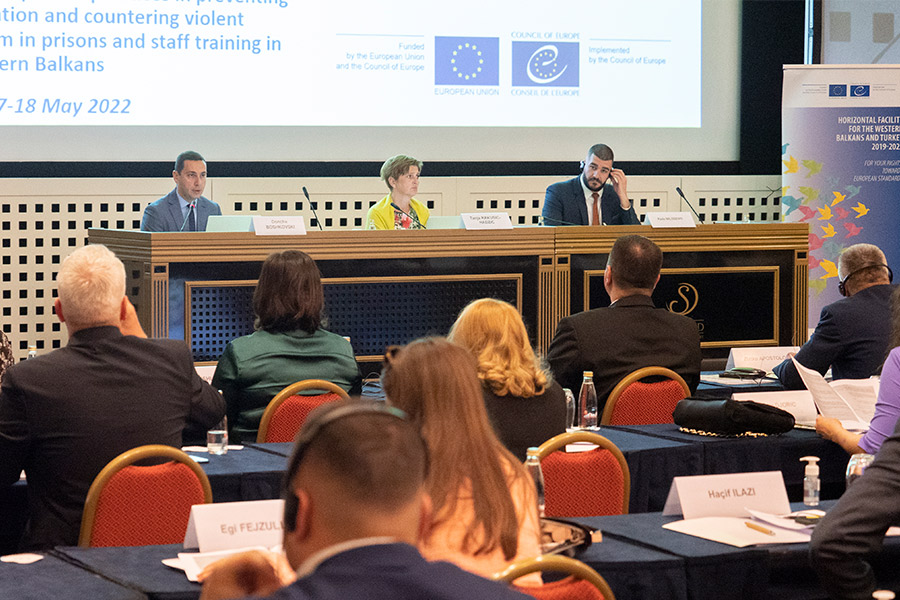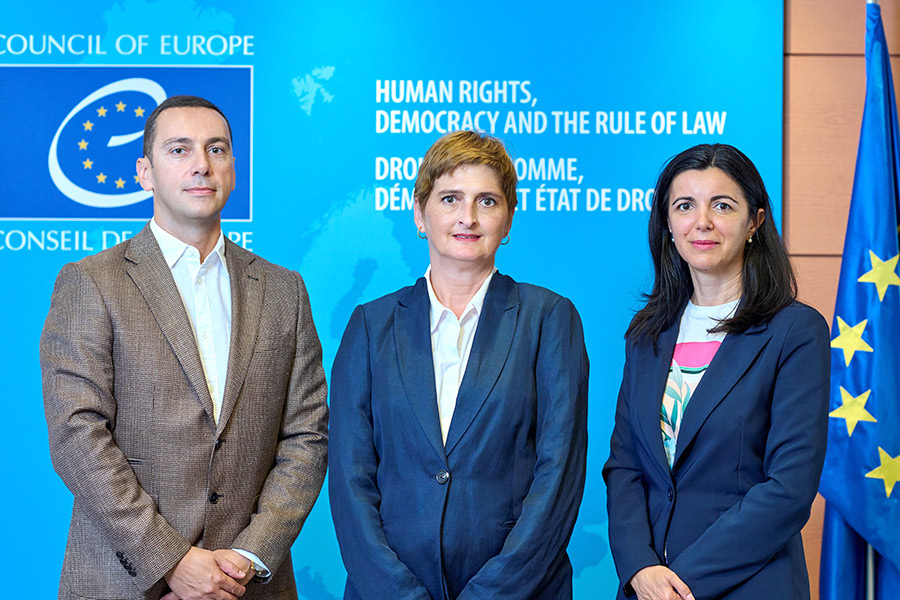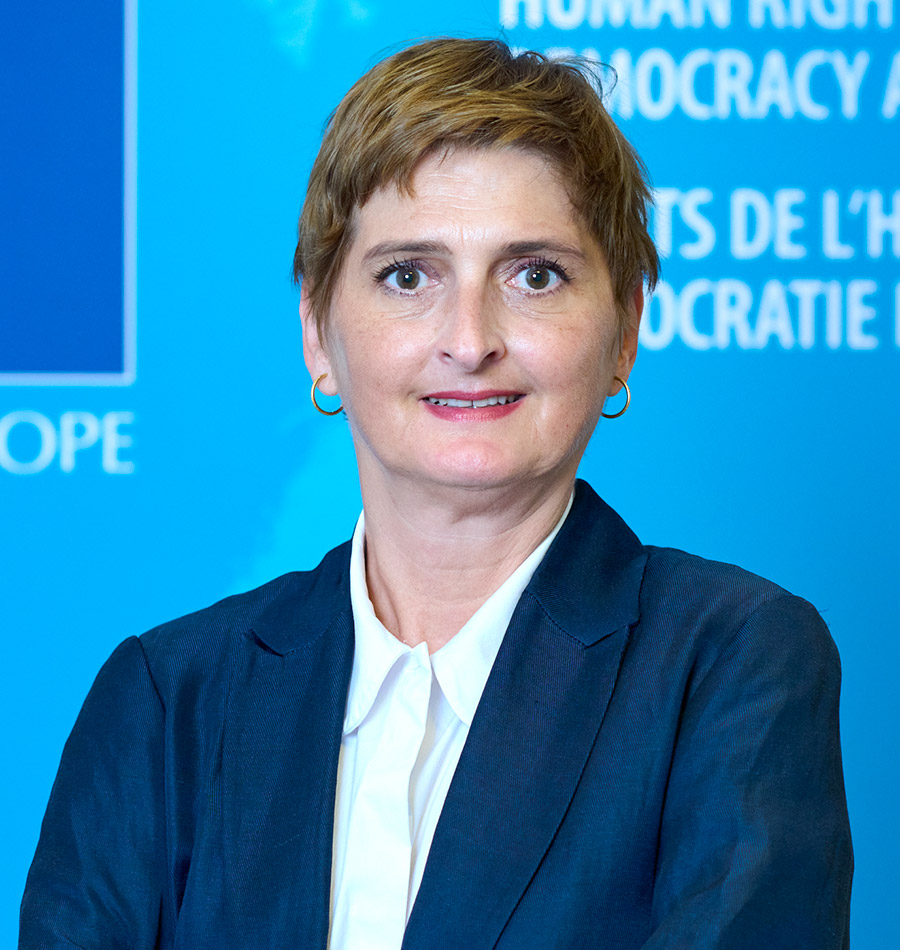Interview
Tanja Rakušić-Hadžić
Head of the Cooperation in Police, and Deprivation of Liberty Division of Directorate General Human Rights and Rule of Law, Council of Europe
The Council of Europe’s Cooperation in Police and Deprivation of Liberty (CPDL) Division together with the Pompidou Group, is part of the Police, Detention, Drugs and Addictions Department of the Directorate General of Human Rights and Rule of Law. Working with national authorities and international organisations, the CPDL implements projects designed to meet the specific needs of Member States in the fields of prisons, probation, and the police.
The CPDL’s work focuses on human rights and management and rehabilitation issues in prisons, as well as combating ill-treatment and impunity in law enforcement structures. Supporting penitentiary systems in addressing radicalisation in prisons and reintegrating violent extremist prisoners (VEPs) has been the main objective of several of CPDL’s interventions across Member States, particularly in the Western Balkans region.
What are the main pillars of the Council of Europe’s work when assisting Member States to align with set European standards in the penitentiary field?
TRH: The whole concept of assisting Member States is based on three pillars of the Council of Europe: standard setting, monitoring, and cooperation.
The Council of Europe is responsible for most of the European standards applicable in the penitentiary field. The two most important are the European Convention on Human Rights (ECHR) and the European Convention for the Prevention of Torture and Inhuman or Degrading Treatment or Punishment which provided for the creation of the European Committee for the Prevention of Torture (CPT).
They require monitoring of their implementation in practice, thus we have, among others, the European Court of Human Rights (ECtHR), which directly monitors the implementation of the ECHR, and the CPT which monitors the conditions and treatment of persons deprived of their liberty throughout Europe. These are followed by a number of recommendations from the Committee of Ministers such as the European Prison Rules, the European Probation Rules, and the European Rules for Juvenile Offenders, to name but a few.
In issue nº 10 of the JUSTICE TRENDS Magazine, you presented the work of the PC-CP, the Council of Europe’s Subcommittee on Penological Cooperation, whose standard-setting work forms the basis for designing CPDL’s projects. And here we come to the third pillar, which is the cooperation or technical assistance we provide to our Member States in integrating Council of Europe standards into their legal system and practice. In practical terms, it means that we discuss with the national authorities their actual needs be it as a result of the adoption of new standards, the findings of the ECtHR, or the reports of the CPT.
We are a demand-driven service, helping Member States to address shortcomings within their systems, namely in the area of probation, police, prisons, and other places where people are de facto deprived of their liberty, such as psychiatric institutions and social care homes. We started out as a prison and police reform unit, and our engagement in the area of probation was a consequence or result of the emerging need to alleviate pressure of the overcrowded prisons across Europe.
The CPDL is currently running 17 fully-fledged projects with an overall value of over €16 million. We also act as an International Partner Organisation in five Member States within the EEA Norway Grants and its Programme Area dealing with correctional services. The Division currently has 46 staff members based in Strasbourg and 11 Council of Europe field offices.
The topics we cover in these projects are wide-ranging, including promoting the implementation of the dynamic security concept, vocational training for prisoners, support for the improvement of probation services, and the establishment of national oversight mechanisms for prisons and police.
We are increasingly involved in improving the provision of healthcare in prisons, including mental health, sometimes through the provision of medical equipment or, as in the case of the COVID-19 pandemic, by assisting prison services to obtain adequate personal protective equipment (PPE).
We support Member States in improving the legislative and institutional framework to incorporate Council of Europe standards, in developing practical guidance and tools, and finally in capacity-building activities, to strengthen the ability of prison/probation/police officers to apply these standards in their daily work.

What barriers are most difficult to overcome in the collaborative process?
TRH: I would say that if the collaborative process has started on the right footing from the beginning, there should be no difficulties, and this is the case with the majority of our cooperation projects. However, prison reform is a long and difficult process that requires continuous political and financial commitment from national authorities and strong support from international partners.
Of course, I am fully aware of the limitations of cooperation projects and that is why the most important part is the discussion with the authorities, which will ensure that the Council of Europe’s added value is used in the most effective way.
We work with a variety of donors who support our activities, but the most prominent is the European Union, our main political and financial partner. Some of our projects have been financed by voluntary contributions from Member States, observer states, non-member states, International Organisations, foundations, etc.
The most difficult barriers are those beyond the control of our projects, such as the military aggression of the Russian Federation against Ukraine, which resulted in Russia’s expulsion from the Council of Europe, or the COVID-19 pandemic.
In some cases, it is possible to develop mitigation plans, as we all did during the pandemic and moved most of our activities online. In another case, where we experienced a transfer of responsibility for prisons from one ministry to another due to a change of government (Greece 2019), the collaboration process required a new set of discussions and negotiations.

JT: Among its ongoing projects in the penitentiary field, CPDL focuses on improving the management and rehabilitation of violent extremist prisoners (VEPs), particularly in the Western Balkans region.
What are the unique challenges related to violent extremists in custodial settings that Member States are more concerned about?
TRH: The CPDL provides significant support to the authorities in the Western Balkans region in tackling radicalisation in prisons. However, despite the efforts made, certain challenges remain to be addressed.
The repatriation of foreign terrorist fighters and their families from Syria is still an ongoing process in the Western Balkans. Furthermore, recent years have been marked by several developments that require all jurisdictions in the region and beyond to remain vigilant and closely monitor ongoing radicalisation trends.
In terms of challenges ahead, ensuring sustainable management of VEPs and other radicalised inmates and preparing them for release still remains the greatest challenge. Some beneficiaries report that the specific risk and needs assessment (RNA) tools and rehabilitation programmes are not fully applied in practice mainly due to systemic deficiencies and institutional weaknesses, but also to high staff turnover, which leads to a lack of trust in staff and requires additional investment in training. As a solution, we have developed human resource management plans with some of the beneficiaries, providing them with clear strategies and guidelines for the allocation of penitentiary human resources to ensure sustainability in the fight against radicalisation in prison settings.
Additional efforts are also needed to further improve post-penal support for VEPs and radicalised inmates and to support their full reintegration into their communities, by ensuring the coherence of the prison-to-release continuum and by involving all relevant stakeholders in the process. It is very important that all actors involved, including local community partners, have access to and benefit from specific training programmes for frontline professionals together with their colleagues in prison. Finally, strengthening the role of probation services in the process is another area that requires our collective attention and support.
The ongoing regional project will continue to build the capacity of existing probation services and other similar service providers in the Western Balkans region. We’re providing specific training activities to better understand the phenomenon and the specific needs of VEPs, thus increasing the capacity of these services and enhancing the skills of staff in preparing and implementing individualised treatment plans for this category of offenders.
What has been the role of CPDL in promoting the enhancement of multi-agency cooperation in the countries you work with? Could you highlight the main changes this has brought into the management of the rehabilitation of violent extremist prisoners?
TRH: Our work in the Preventing and Countering Violent Extremism (P/CVE) field has focused on the Western Balkans region and the specific needs of these jurisdictions. With our support, these penitentiary systems were empowered with screening, RNA tools and rehabilitation programmes for VEPs, thereby strengthening their institutional capacity in this area. The intervention tools have been developed in line with the best EU and RAN best practices, following CoE standards and principles, in particular the Guidelines and Handbook for Prison and Probation Services on Radicalisation and Violent Extremism.
Prison staff have significantly increased their capacity to use the tools in their daily work through capacity-building sessions and the learning-by-doing method (piloting and coaching sessions facilitated by CPDL).
In line with the CoE Guidelines on recruitment, selection, education, training and professional development of prison and probation staff, we are in the process of designing and implementing P/CVE-specific training curricula for staff in some of the beneficiaries.
This will have a twofold prison-wide effect – both at a basic awareness level for prison practitioners who do not necessarily deal with VEPs and as an advanced training programme for prison multidisciplinary teams who work with this category of prisoner on a daily basis. In its projects, CPDL promotes multi-agency working to ensure the reintegration of offenders into society. Through a series of grant agreements and local forums, with more than 750 participants in the Western Balkans region, we have initiated inter-institutional discussions and laid the foundations for creating long-term synergies.
Representatives from the prison and probation systems, different levels of government, civil society, municipalities and religious communities agreed on common approaches for the successful reintegration of VEPs into society. These forums allowed participants to openly discuss pressing issues and ways to ensure sustainable cooperation, highlighting their roles and tasks in the process. It is also worth mentioning that, as part of the regional action, CPDL established a regional network of P/CVE specialists, composed of prison, probation and other practitioners and decision-makers. This has further promoted a culture of sharing information, know-how and good practices and ensured regular communication between P/CVE practitioners in the region.
Tanja Rakušić-Hadžić
Head of the Cooperation in Police, and Deprivation of Liberty Division of Directorate General Human Rights and Rule of Law, Council of Europe
Tanja Rakušić-Hadžić is head of the CPDL Division of the Council of Europe’s Directorate of Human Rights. Since 2007, she has been managing technical assistance programmes for Member States in the field of prisons, probation, police, psychiatric institutions, and social care homes. A lawyer by training, she held several positions in the Office of the Human Rights Ombudsman and the Office of the High Representative in Bosnia and Herzegovina before joining the Council of Europe in 2003 to work on cooperation projects in the fields of human rights and judicial reform.


